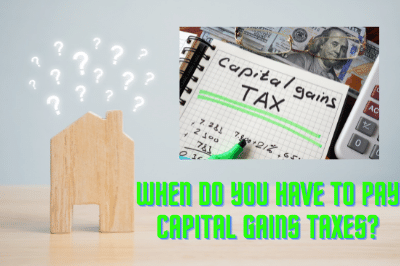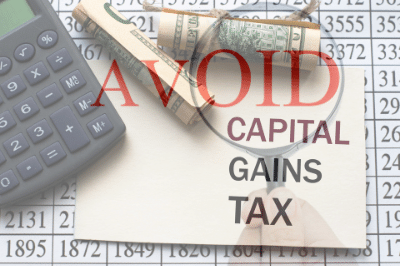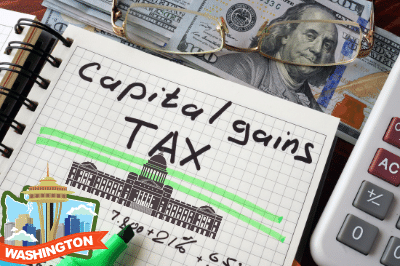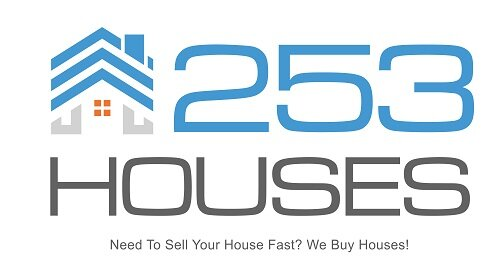If you’re selling a home in Washington, it’s important to understand how the state’s capital gains tax works. This tax is imposed on the profit from the sale of capital assets, including real estate.
Table of Contents
• What Is Capital Gains Tax?
• Washington State Capital gains tax on real estate
• When Do You Have to Pay Capital Gains Taxes?
• Capital Gains Taxes on Investment Property
• How to avoid capital gains tax on real estate?
⮩ Want to sell your property in Washington State without any hassle?
What Is Capital Gains Tax?
The capital gains tax is a tax on the profit from the sale of capital assets, including real estate. The capital gain is the difference between the selling price and the original purchase price of the asset.
For example, if you buy a house for $200,000 and sell it for $250,000, your capital gain would be $50,000. If you’re in the 25% tax bracket, you would owe $12,500 in capital gains taxes on the sale.
However, there are ways to avoid or minimize this tax. Read on to learn more about how the capital gains tax works in Washington and what steps you can take to avoid it.
Washington State Capital gains tax on real estate
In Washington, the capital gains tax on real estate is levied at a rate of 0.3% of the sale price. This means that if you sell your home for $250,000, you would owe $750 in capital gains taxes.
There is a $25,000 exemption for capital gains on the sale of a personal residence, which means that you don’t have to pay taxes on the first $25,000 of capital gain. So, if your capital gain is less than $25,000, you won’t owe any capital gains taxes on the sale.
However, if you sell your home for more than $250,000, you will owe capital gains taxes on the amount over $25,000. If you owe taxes on the sale of your home, you will need to file a capital gains tax return with the IRS.
When Do You Have to Pay Capital Gains Taxes?

You only have to pay capital gains taxes if you sell your home for more than you paid for it. If you sell your home for less than you paid for it, you can deduct the capital loss from your other income on your tax return.
For example, if you bought a house for $200,000 and sold it for $150,000, you would have a capital loss of $50,000. You could deduct this amount from your other income on your tax return, which could reduce the amount of taxes you owe. If you pay capital gains tax on the sale of your home, you can deduct it from the sales price when you file your taxes. Capital asset losses can also be carried forward to future years. Short-term capital gains are taxed as regular income. If you generate income from the sale of capital assets held for less than a year, it is considered short-term capital gain and is taxed at your marginal tax rate.
Capital Gains Taxes on Investment Property
If you sell an investment property, such as a rental property, you will owe capital gains taxes on the profit from the sale. The tax is calculated based on your capital gains percentage, which is the difference between your basis in the property and the sales price, divided by the sale price.
For example, if you bought a rental property for $100,000 and sold it for $200,000, your capital gain would be $100,000. Your capital gains percentage would be 100%, so you would owe capital gains taxes on the entire profit. Tax rates vary depending on your income level, but capital gains taxes on investment property are typically higher than capital gains taxes on the sale of a personal residence. Rental properties are considered capital assets, so you will need to file a capital gains tax return with the IRS when you sell them.
How to avoid capital gains tax on real estate?
In Washington, capital gains taxes on real estate must be paid within 20 days of the sale. However, you may be able to postpone paying the tax if you reinvest the proceeds from the sale into another qualifying property within 60 days. Tax exclusion is also available for capital gains on the sale of a primary residence if you have lived in the home for at least two years.
There is no capital gains tax on the sale of a personal residence in Washington. This exemption also applies to married couples who file their taxes jointly. So, if you sell your home for more than $250,000, you won’t have to pay capital gains taxes on the amount over $250,000 as long as you don’t reinvest the proceeds into another property. Another way to avoid capital gains taxes on the sale of your home is to move into a new home within 60 days of the sale and use the proceeds from the sale to buy the new home.

How to avoid capital gains tax on the sale of your home in Washington

There are a few ways to avoid or minimize capital gains taxes when selling your home in Washington.
First, you may be eligible for the $25,000 exemption if you’ve lived in your home for at least two years. This exemption applies to capital gains up to $250,000 for single filers and $500,000 for married couples filing jointly.
If you’re over the age of 55, you may also be eligible for a one-time exclusion of up to $100,000 of the capital gain on the sale of your primary residence. To qualify, you must have owned and lived in your home for at least 10 years.
Want to sell your property in Washington State without any hassle?
Instead of selling the house with a real estate broker or getting a real estate agent, you can try and sell it to us instead! The process of selling your property can be difficult. There are many considerations to take into account and the right decisions need to be made at every step for things to go smoothly. If you would like more information about any specific aspect of what is required during the sell-a-home process whether shared or not please do not hesitate to reach out, 253 Houses can most certainly help you! Just Fill up the form below, or call us at (253) 330-8228 and you will receive a cash offer for your home within 24 hours, with no hidden fees or closing costs, all in its fair market value. We want your experience going through this challenging time as smooth as possible.

